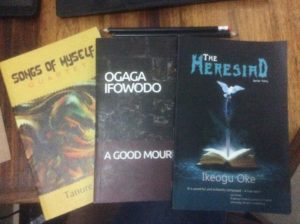I have just finished reading the third of the books on the 2017 Nigerian Prize for Literature shortlist, and I’m overwhelmed by the range, depth, and quality of their offerings. It is such an impressive collection.

When I started, last week, with one of the books, I was sure that I had found the winning work. But after having read the three, I’m no longer that certain. Each book brings to the table an array of class, style, content, beauty, and a lot of pedigree. Contrary to social media jabber, I can say that this is an impressive shortlist, each writer deserving of their place on it.
In the next couple of days, perhaps one per day, I hope to post my thoughts on each these books as I see them.
Needless to say, reviews and criticism of works selected for public fêting are essential to the growth of a literary industry. From Facebook to Twitter, we have seen no shortage of individual opinions on the Nigerian Prize, its shortcomings, and other matters. What we haven’t found are sustained conversations about each of the works shortlisted. Aside from book readings organized by Cora and sometimes by NLNG itself, there haven’t been many avenues to engage with the work and the writers themselves. Not even in our newspapers, except for scattered profiles and op-eds on the nature of prizes. And that is a shame.
One of the reasons the Caine Prize (and other prizes smaller than it) have earned such a reputation as important relevant prize institutions is the level of engagement that each of their annual prize seasons brings to literature and to the writers themselves. We can complain all we want about what NLNG is or isn’t doing, but as an industry of writers, much of the fault lay with us and our inability to engage in a constructive, intellectually satisfying way when it comes to book shortlists. It is not the size of the prize pot that brings prestige to a prize. It is the type of value that the conversations around the prize add to the standard of subsequent entrants which then hopefully spirals forward into an improved culture and tradition of writing across the country. Without critical attention on a sustained basis, we are equally as complicit in whatever downward spiral attends our inactivity.
Tomorrow on Lagos Island, I will be engaging the three writers in a televised interview. I intend to post the full videos here when they are ready. I also intend to talk with the prize administrators, as well as a member of the prize advisory on a number of issues that have been raised over the years about the prize and its role in shaping the writing culture around Nigeria.
But before then, watch out for my review of each of the three books on the 2017 shortlist.
___
UPDATE (September 25, 2017)
- The first review is of Ogaga Ifowodo’s A Good Mourning. Read it here.
2 Comments to Reviewing the 2017 Nigerian Literature Prize Trio so far. (RSS Feeds for comments in this post)